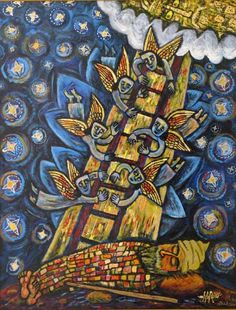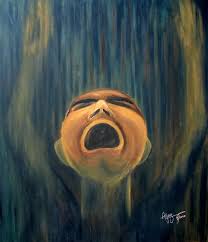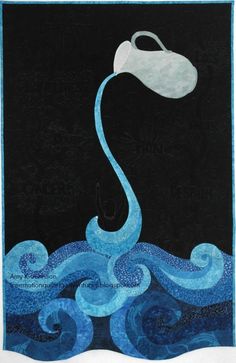Torah Reflections
Divrei Torah by Rabba Kaya Stern-Kaufman
 This Shabbat we read the story of Jacob’s journey, beginning at a moment of intense drama. Jacob has just stolen his brother Esau’s blessing from his blind father Isaac by impersonating Esau. He is on the run from a brother who has vowed to kill him. Our portion opens with Jacob fleeing his home and arriving at a new place. As the sun sets and Jacob lies down, using a rock for a pillow, he has the following dream: there is a ladder, with its feet on the earth and its head in the sky. Upon it, angels are ascending and descending. God is directly above and speaks to Jacob, telling him: “this land on which you are lying, I will give to you, and to your descendants; And your descendants shall be as numerous as the sand of the earth, and you shall spread abroad to the west, to the east, to the north, and to the south; and through you and your descendants shall all the families of the earth be blessed. And, Here-Now- I am with you, and I will guard you in all the places you go, and I will bring you back to this land; for I will not leave you…” Jacob wakes up suddenly. He calls out, “God is in this place and I didn’t even know it! How awesome is this place! This must be the House of God and right here, the gateway to heaven.” Most of the traditional commentators understand this dream to be a prophecy about the physical place where Jacob lies. They say that this physical place is Har Ha-Moriah, the place where Isaac, his father was bound on the altar and which will become the site for the Holy Temple. Yet, according to the plain meaning of the text, the p’shat, Torah presents a dreamscape, an expression of Jacob’s inner world, his psyche and the fulfillment of his spiritual needs at this moment. For, at this moment Jacob is frightened. He is fleeing from the tents to which he has grown accustomed. He is, after all, described by Torah as yosheiv ohalim, the one who dwells inside, in the tents. But the safe world in which he has lived has altered completely. Jacob’s dream is a moment of expanded consciousness. The veil over his lower consciousness is lifted and he catches a glimpse of the much larger story in which he is but one player. He sees that he is not alone and that his feeling of anxious separation is but an illusion. Heaven and earth are connected, always connected. Angelic beings traverse the two worlds. He receives assurance that God is with him and will keep him safe. When he awakens he cries out, “God is in this place and I didn’t even know it!” I was unconscious to the this greater Presence, but now I am awake and I realize that I am not alone. Jacob realizes that God resides even in this place where he feels terrified. God is even in this place, that the Rabbis say is Har HaMoriah, the place where his father Isaac experienced terror as he was bound on an altar. This is Jacob’s revelation; that even in the place of existential fear, God is present. Today, we are living through such volatile times. Many of us are feeling a new and more profound sense of vulnerability. This week Torah gives us a dream in order to wake us up. It says, Remember. This moment of instability is but a small piece of a much longer and larger story. Remember that there is an arc of progress that flows from the deep past into the distant future. Remember that God is in THIS PLACE- THIS MOMENT. The future is a mystery; yet in this present moment, a greater awareness of connection, of support and love is available. The Kotzker Rebbe once answered the question, ‘where is God to be found’ with the words, ‘wherever you let God in.’ And so on Shabbat we practice letting God in. But really, this is a practice for all moments and all places. Whether through prayer, meditation or the practice of mitzvoth, we are attuning ourselves to the awareness that God is present and with us in all moments. And so my prayer today is that we may anchor ourselves in the present moment and not in our fears about tomorrow; that we remember the light that emanates from our souls, and that we seek out the Divine spark that resides within every person. Let us each BE the ladder that connects heaven and earth so that we might offer this blessing to all whom we encounter: ma norah hamakom hazeh - how truly awesome is this place, this moment of connection.  On this anniversary of Kristallnacht we read a story of two Brothers. Isaac loved Esau and Rebecca loved Jacob A house divided- love in short supply- a zero-sum game Two brothers- so different One, a hairy man of the field, a hunter One, a smooth skinned man of the tents One impulsive One conniving Jacob shrewdly manipulates his brother Esau, takes advantage of his weaknesses- of his impulsive hunger and acquires Esau’s birthright. At the end of this Torah portion, Jacob approaches his blind father, Isaac. Disguised as Esau, he steals the blessing of the firstborn meant for his brother. And it came to pass, as soon as Isaac had finished blessing Jacob, and Jacob had scarcely gone out from the presence of Isaac his father, that Esau his brother came in from his hunting. And he also had made savory food, and brought it to his father, and said to his father, Let my father arise, and eat of his son’s venison, that your soul may bless me. And Isaac his father said to him, Who are you? And he said, I am your son, your firstborn Esau. And Isaac trembled very much, and said, Who then is he who hunted venison, and brought it to me, and I have eaten of all before you came, and have blessed him? Moreover, he shall be blessed. And when Esau heard the words of his father, he cried with a great and very bitter cry, and said to his father, Bless me, me also, O my father. And Isaac said, Your brother came with cunning, and has taken away your blessing. And he said,… Have you not reserved a blessing for me? … …Have you but one blessing, my father? bless me, me also, my father. And Esau lifted up his voice, and wept. .. And Esau hated Jacob because of the blessing with which his father blessed him; and Esau said in his heart, When the days of mourning for my father are over; then will I slay my brother Jacob. (Gen. 27: 30-41) I cannot read this portion without hearing the tza’akah gedolah, the great cry of Esau. When love is denied, love withheld When one is disenfranchised, robbed of power, resources and respect Anger erupts- homicidal anger Esau cries out like a trapped and wounded animal- a great cry of pain, a deep emotional pain. He has been violated, robbed of his father’s blessing and of his future. He is bereft. Is it no wonder that his anger explodes into homicidal rage? We are living in a time of explosive anger. In just these past two weeks we have seen these horrors: This past Wednesday night thirteen human beings were murdered in Thousand Oaks, CA by an ex-Marine, who had served in Afghanistan. One week ago in a Florida yoga studio, two women were shot and killed and 5 others were injured by a man who claimed to hate women. In Pittsburgh, two weeks ago, eleven worshippers were murdered in their synagogue by an anti-semite incensed over refugees entering the country. Earlier that same week, two African Americans were murdered in a supermarket in Kentucky by a racist who had previously tried to enter a Black Church aiming to annihilate even more people. We must ask: what has become of our society? We have become a land that foments hatred, that sees only ‘us and them’. Where is the ‘we’ that lives together as ‘one Nation, under G-d , indivisible, with liberty and justice for all?’ One thing that surely has changed is the way we communicate with one another. The Internet and social media have become a feeding ground for the best and worst within us, exponentially magnifying our highest and lowest urges; a lethal echo chamber wherein every hateful idea is magnified and supported by a community of anonymous members. Freedom of information has morphed into freedom to hate and freedom to create a gun on a 3D printer, and freedom to walk into a public gathering and murder more anonymous people. Torah has something to say about violence, about murderous rage. Love denied, love withheld produces such fury. Two brothers - Cain and Abel Cain’s gift is rejected by G-d. His brother’s offering is accepted. Love withheld, love denied. Cain rises up and murders his brother Abel. When love is denied, love withheld When one is disenfranchised, robbed of power, resources and respect Anger arises- homicidal anger Joseph and his Brothers A house divided- love in short supply Joseph is chosen, loved and privileged by his father. His brothers, angered and outraged, conspire to kill. Unheard, Unseen, Unloved- Homicidal Rage Flares A gun is power restored anger expressed a voice professed for the world to hear. For a brief moment, the awesome power of life and death is held in the hands of one who is enraged and disempowered. The voice screams: I am here and I will be heard. There is a voice screaming from our land. It cries out, “No one cares about me. No one cares about my future” and it echoes in all the social sickness of our times. Esau’s cry is the unheard scream of our time, a tza’akah gedola, a great and mighty scream that says, “but what about me? Is there only one blessing? Is there not some blessing left for me too?” What would happen if we stopped long enough to hear this voice? Our tradition teaches that the whole world exists by virtue of the Divine quality of hesed- loving-kindness. To live without the experience of loving-kindness, is to feel dead. Torah charges us to love, to extend loving-kindness into the world because it is only through this quality that the world can continue to exist. It is our task to open our ears to the cries of those who feel disenfranchised, to those among us who are suffering, isolated and alone. It is up to us to restore connections by building strong communities of caring where all are seen and heard. It begins by creating opportunities to gather together in warmth and friendship. It begins with simple acts, like offering a smile to someone you might otherwise have ignored. The smile conveys, “I see you and I value you.” The Netivot Shalom (the Slonimer Rebbe, R. Shalom Noach Berezovsky 1911- 2000) says “Any day that we do not perform some act of hesed/ loving-kindness, we fail to prepare a vessel into which God’s hesed can flow into us. Any day in which we do not perform some act of hesed is a day in which we have not really lived” And I would add, that any day we have not performed an act of hesed/ loving-kindness is a day we have not brought life into the world. Our task is to be a vessel for the flow of hesed into the world. This is what it means to ‘Love G-d’ and to ‘Love your neighbor.’ So let us become aware of whom we see, whose cries we hear, whom we value and whom we discard. It is time to hear the scream of Esau and all those who do not have a voice. Jacob and Esau need not be locked in an eternal rivalry. The field of blessings is as large as we build it. It is time to enlarge the picture, enlarge the field of blessings, to create the world we wish to inhabit. It is time to move from ‘us and them’ to ‘we’. Let us look to each day as an opportunity to perform at least one act of hesed. The time is now. We are all responsible. We are all connected. We are all bound up in one another.  After the trauma of the Akeida (the binding of Isaac onto the altar by his father Abraham) and after the death of Sarah, the Torah seeks out healing. The Torah seeks out the only possible path for healing: loving-kindness-hesed. It is the path of loving-kindness that will enable the survivors of trauma and loss to survive and move forward. After mourning Sarah’s death, Abraham performs his final act of hesed, of loving-kindness for her by seeking out and acquiring for her, a burial place. After this episode he sends out his servant Eliezer to find a wife for Isaac. Eliezer is on a hesed-seeking mission. He asks for G-d’s help in finding a woman who will not only offer him water after his long desert journey but who will recognize the thirst of his camels as well. He seeks a woman whose loving-kindness knows no distinctions. Water: the symbol of life-giving hesed flows from the jugs of Rivkah- a universal hesed, for human beings and animals alike. And it is this quality of hesed that will be a comfort to Isaac, a source of healing for him after the traumas of his life. And Isaac brought her into the tent of his mother Sarah, and he took Rebecca as his wife. Isaac loved her and found comfort after his Mother’s death. (Gen, 24:67) As we begin to lift ourselves up from this week of shiva after the horror in Pittsburgh, after the trauma of this shocking and disorienting event- it is the comfort of hesed that we need; life-giving, tender and easily accessible loving-kindness. We have all experienced a profound outpouring of hesed from our community and from diverse communities around the nation. I know you too feel the great outpouring of love and support from the Rutland community. Like Eliezer , let us continue to seek it out. Let us be on a hunt for kindness. Let us seek it within and without. And let our seeking be a finding, and an allowing- let us allow the waters to flow- the waters of grief and the waters of love for humanity. We sit here tonight still in mourning, wondering what we can do. Some of us feeling paralyzed and hopeless. Let us not be daunted by the enormity of this grief. At this moment, on this Shabbat, let us simply notice how we feel and allow the life-giving waters of kindness to flow through our community. A modern poet- Martha Postelwaite, offers us these words: Do not try to save the whole world or do anything grandiose. Instead, create a clearing in the dense forest of your life and wait there patiently, until the song that is your life falls into your own cupped hands and you recognize and greet it. Only then will you know how to give yourself to this world so worthy of rescue. We begin with noticing and allowing. Noticing the grief and also the hesed that surrounds us. This is where we are tonight. As we move forward let hesed- lovingkindness be the scale against which we measure all of our actions, all of our choices, and all of our votes. Let hesed-loving-kindness be the scale against which we measure our connections with one another and our strength as a community. We are all bound up in one another. May we recognize this as our strength and our blessing. |
Rabba Kaya Stern-KaufmanRabba Kaya served as Interim Rabbi of RJC from October 2017 through June 2019.
More about Rabba Kaya Archives
July 2019
|
OFFICE Hours
|
Telephone802-773-3455
|
Email ADDRESS |
